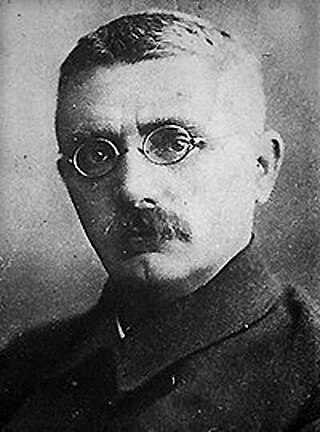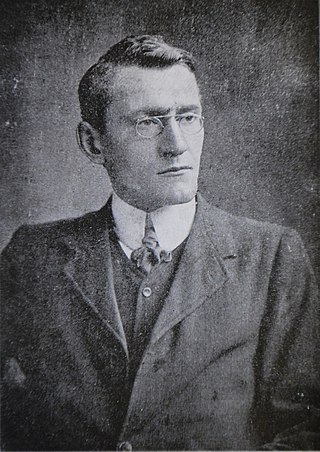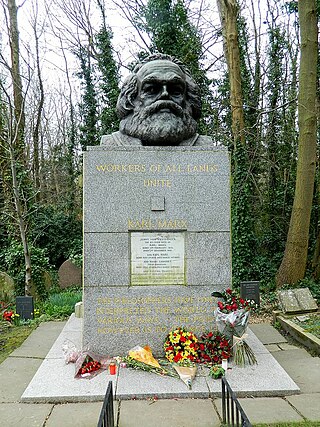
Lev Davidovich Bronstein, better known as Leon Trotsky, was a Russian revolutionary, politician, and political theorist. He was a central figure in the 1905 Revolution, October Revolution, Russian Civil War, and establishment of the Soviet Union. Trotsky and Vladimir Lenin were widely considered the two most prominent Soviet figures, and Trotsky was "de facto" second-in-command during the early years of the Russian Soviet Republic. Ideologically a Marxist and Leninist, his thought and writings inspired a school of Marxism known as Trotskyism.

Leninism is a political ideology developed by Russian Marxist revolutionary Vladimir Lenin that proposes the establishment of the dictatorship of the proletariat led by a revolutionary vanguard party as the political prelude to the establishment of communism. Lenin's ideological contributions to the Marxist ideology relate to his theories on the party, imperialism, the state, and revolution. The function of the Leninist vanguard party is to provide the working classes with the political consciousness and revolutionary leadership necessary to depose capitalism.

Trotskyism is the political ideology and branch of Marxism developed by Russian revolutionary and intellectual Leon Trotsky along with some other members of the Left Opposition and the Fourth International. Trotsky described himself as an orthodox Marxist, a revolutionary Marxist, and a Bolshevik–Leninist as well as a follower of Karl Marx, Frederick Engels, Vladimir Lenin, Karl Liebknecht, and Rosa Luxemburg. His relations with Lenin have been a source of intense historical debate. However, on balance, scholarly opinion among a range of prominent historians and political scientists such as E.H. Carr, Isaac Deutscher, Moshe Lewin, Ronald Suny, Richard B. Day and W. Bruce Lincoln was that Lenin’s desired “heir” would have been a collective responsibility in which Trotsky was placed in "an important role and within which Stalin would be dramatically demoted ".

Nadezhda Konstantinovna Krupskaya was a Russian revolutionary and the wife of Vladimir Lenin.

George Noble Plunkett was an Irish nationalist politician, museum director and biographer, who served as Minister for Fine Arts from 1921 to 1922, Minister for Foreign Affairs from 1919 to 1921 and Ceann Comhairle of Dáil Éireann in January 1919. He served as a Teachta Dála (TD) from 1918 to 1927. He was a Member of Parliament (MP) for Roscommon North from 1917 to 1922.

Ivan Nikitich Smirnov was a Russian Bolshevik revolutionary, Soviet politician and Communist Party functionary. A prominent member of the Left Opposition, he led a secret Trotskyist opposition group in the Soviet Union during the Stalin period. He was arrested in 1933 and shot during the Great Purge.
The Limerick Soviet was one of a number of self-declared Irish soviets that were formed around Ireland circa 1919. The Limerick Soviet existed for a two-week period from 14 to 27 April 1919. At the beginning of the Irish War of Independence, a general strike was organised by the Limerick Trades and Labour Council, as a protest against the British Army's declaration of a "Special Military Area" under the Defence of the Realm Act, which covered most of Limerick city and a part of the county. The soviet ran the city for the period, printed its own money and organised the supply of food. The Limerick Soviet was one of a number of Irish soviets declared between 1919 and 1923.
In Marxist theory, a new democratic society will arise through the organised actions of an international working class, enfranchising the entire population and freeing up humans to act without being bound by the labour market. There would be little, if any, need for a state, the goal of which was to enforce the alienation of labor; as such, the state would eventually wither away as its conditions of existence disappear. Karl Marx and Friedrich Engels stated in The Communist Manifesto and later works that "the first step in the revolution by the working class, is to raise the proletariat to the position of ruling class, to win the battle of democracy" and universal suffrage, being "one of the first and most important tasks of the militant proletariat". As Marx wrote in his Critique of the Gotha Program, "between capitalist and communist society there lies the period of the revolutionary transformation of the one into the other. Corresponding to this is also a political transition period in which the state can be nothing but the revolutionary dictatorship of the proletariat". He allowed for the possibility of peaceful transition in some countries with strong democratic institutional structures, but suggested that in other countries in which workers can not "attain their goal by peaceful means" the "lever of our revolution must be force", stating that the working people had the right to revolt if they were denied political expression. In response to the question "What will be the course of this revolution?" in Principles of Communism, Friedrich Engels wrote:
Above all, it will establish a democratic constitution, and through this, the direct or indirect dominance of the proletariat.

Revolutionary Marxist Group was a Trotskyist organisation in Ireland during the 1970s.

The Irish Worker League was an Irish communist party, established in September 1923 by Jim Larkin, following his return to Ireland. Larkin re-established the newspaper The Irish Worker. The Irish Worker League (IWL) superseded the Revolutionary Workers' Groups circa 1930.

Richard Francis Hayes was an Irish politician, historian and medical doctor. He was a volunteer and fought in the Easter Rising in 1916 and was involved in the Garristown and Ashbourne fighting.
In 1921, factions were banned in the Russian Communist Party (Bolsheviks) according to democratic centralism. Vladimir Lenin described the ban as temporary and had criticised a proposed amendment for a permanent ban as "excessive" and "impracticable". The ban was seen as temporary by contemporaries during the period.
A workers' council, also called labor council, is a type of council in a workplace or a locality made up of workers or of temporary and instantly revocable delegates elected by the workers in a locality's workplaces. In such a system of political and economic organization, the workers themselves are able to exercise decision-making power. Furthermore, the workers within each council decide on what their agenda is and what their needs are. The council communist Antonie Pannekoek describes shop-committees and sectional assemblies as the basis for workers' management of the industrial system. A variation is a soldiers' council, where soldiers direct a mutiny. Workers and soldiers have also operated councils in conjunction. Workers' councils may in turn elect delegates to central committees, such as the Congress of Soviets.
Revolutionary socialism is a political philosophy, doctrine, and tradition within socialism that stresses the idea that a social revolution is necessary to bring about structural changes in society. More specifically, it is the view that revolution is a necessary precondition for transitioning from a capitalist to a socialist mode of production. Revolution is not necessarily defined as a violent insurrection; it is defined as a seizure of political power by mass movements of the working class so that the state is directly controlled or abolished by the working class as opposed to the capitalist class and its interests.

World revolution is the Marxist concept of overthrowing capitalism in all countries through the conscious revolutionary action of the organized working class. For theorists, these revolutions will not necessarily occur simultaneously, but where and when local conditions allow a revolutionary party to successfully replace bourgeois ownership and rule, and install a workers' state based on social ownership of the means of production. In many Marxist schools, such as Trotskyism and Communist Left, the essentially international character of the class struggle and the necessity of global scope are critical elements and a chief explanation of the failure of socialism in one country.
The Irish Marxist Society was a Eurocommunist organisation active in Ireland in the 1970s.
Revolutionary Workers' Groups (RWG) were left wing groups in Ireland officially founded in 1930 with the objective of creating a Revolutionary Workers' Party. Formed initially as the Preparatory Committee for the Formation of a Workers’ Revolutionary Party, it changed its name in November 1930. It was helped to be established by Bob Stewart and Tom Bell from the Communist Party of Great Britain and Comintern. In 1933 they disbanded and established the Communist Party of Ireland.

Far-left politics in the United Kingdom have existed since at least the 1840s, with the formation of various organisations following ideologies such as Marxism, revolutionary socialism, communism, anarchism and syndicalism.

The Irish soviets were a series of self-declared soviets that formed in Ireland during the revolutionary period of the Irish War of Independence and the Irish Civil War, mainly in the province of Munster. "Soviet" in this context refers to a council of workers who control their place of work, not a Soviet state.
Peter Graham was an Irish republican and Marxist who worked as an electrician.












